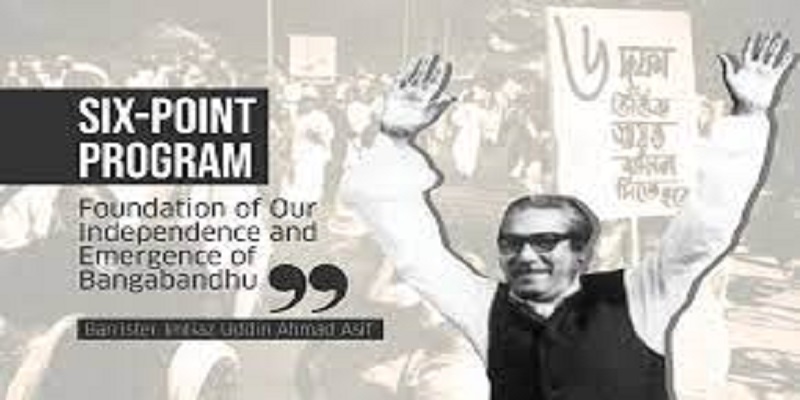Sheikh Mujib's Six-Points Bangladesh's Destiny
Sheikh Mujib-ur-Rehman, also known as the "Father of the Nation" in Bangladesh, played a pivotal role in the country's struggle for independence and later served as its first President and Prime Minister. His political philosophy and vision for Bangladesh can be encapsulated in what is commonly known as the "Six-Points," a set of demands he articulated in the 1960s. These points were instrumental in shaping the trajectory of Bangladesh's independence movement and laid the foundation for its governance structure. In this essay, we will explore the Six-Points of Sheikh Mujib-ur-Rehman, their historical context, and their enduring impact on the nation.
- Background and Historical Context:
The Six-Points were formulated against the backdrop of political discontent and economic disparities in East Pakistan, the eastern wing of Pakistan. In the aftermath of the creation of Pakistan in 1947, East Pakistan faced neglect and exploitation by the central government in West Pakistan. The cultural, linguistic, and economic differences between the two regions led to growing discontent in East Pakistan. Sheikh Mujib-ur-Rehman emerged as a charismatic leader who sought to address these grievances and advocate for the rights of the Bengali-speaking population.
- Autonomy and Federalism:
The first point of Sheikh Mujib's agenda called for the recognition of East Pakistan as an autonomous and economically independent region within the federal structure of Pakistan. He argued for a more decentralized governance model that would empower the provinces, allowing them greater control over their economic and political affairs. This demand for autonomy was a response to the central government's concentration of power in West Pakistan, often at the expense of the eastern region.
- Control over Economy:
The second point emphasized the need for East Pakistan to have control over its economic resources. Sheikh Mujib asserted that the region's economic planning and management should be in its own hands to address the economic disparities that existed between the two wings of the country. This demand for economic autonomy reflected the economic exploitation faced by East Pakistan and the desire to bridge the development gap between the two regions.
- Monetary Autonomy:
The third point focused on the establishment of a separate currency for East Pakistan. This was a crucial aspect of Sheikh Mujib's vision to ensure greater economic independence for the region. A separate currency would give East Pakistan more control over its monetary policy and economic stability, reducing its dependence on decisions made in West Pakistan that did not necessarily align with the interests of the eastern wing.
- Control over Military:
Sheikh Mujib's fourth point underscored the need for East Pakistan to have its own military forces. This demand was rooted in the experiences of political and military dominance by West Pakistan, which often marginalized the eastern region in matters of national defense. By advocating for a separate military for East Pakistan, Sheikh Mujib sought to ensure the security and defense interests of the region were safeguarded.
- Fair Representation in Civil Services:
The fifth point called for equitable representation of East Pakistanis in the country's civil services. Sheikh Mujib highlighted the systemic discrimination in the recruitment and distribution of bureaucratic positions, which disproportionately favored individuals from West Pakistan. This demand aimed to rectify the imbalance and ensure that East Pakistanis had a fair share in the administrative machinery of the country.
- Separate Accounts and Taxation:
The sixth and final point emphasized the establishment of separate bank accounts for East Pakistan to manage its finances independently. This demand also extended to the right of East Pakistan to collect and utilize its own taxes, further reinforcing the call for economic autonomy. Sheikh Mujib argued that this fiscal independence would enable the region to address its economic challenges more effectively and promote sustainable development.
Sheikh Mujib-ur-Rehman's Six-Points were a comprehensive set of demands that articulated the aspirations of the people of East Pakistan for autonomy, economic justice, and political representation. These points became the cornerstone of the movement for the independence of Bangladesh, ultimately leading to the Liberation War of 1971 and the creation of the sovereign state of Bangladesh. The Six-Points continue to be celebrated as a symbol of the struggle for self-determination and remain integral to the historical and political identity of Bangladesh.

